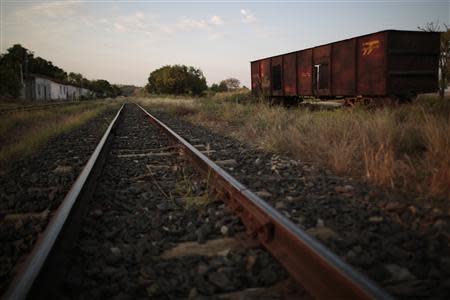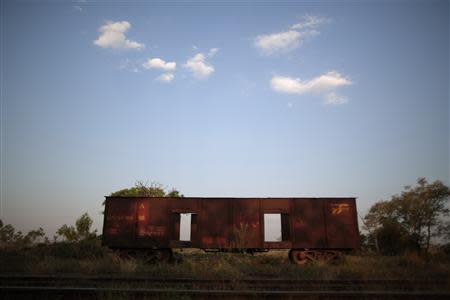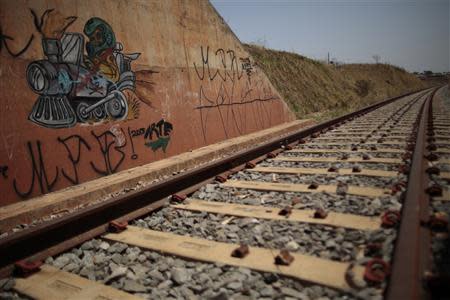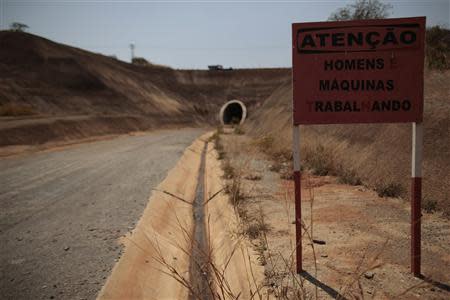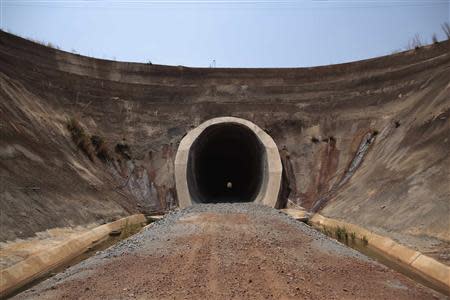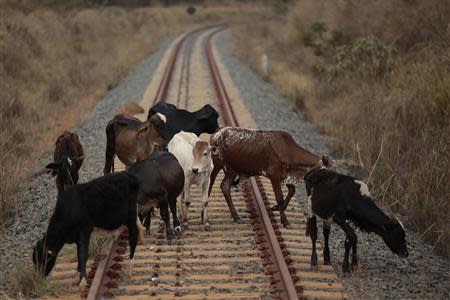Brazil's railroad plan has yet to leave the station
By Anthony Boadle BRASILIA (Reuters) - More than a year has passed since Brazilian President Dilma Rousseff announced an ambitious plan to raise billions of dollars to lay much-need railroad tracks across this continent-sized nation. Not a single mile has been laid, however. Investors are balking at the push to build some 10,000 km (6,000 miles) of track because they worry that government policies might not make it worth their while. By forcing power companies to slash electricity rates, requiring banks to cut interest rates and opening highway auctions that limit returns by awarding concessions to the bidder that pledges to charge the lowest toll, Brazil under Rousseff has lost some of its allure for many investors. That has cast a pall over what many say should be a sure bet: building and operating roads, seaports, airports and railroads in an emerging economy and agricultural superpower whose infrastructure badly needs a facelift. "The potential here is huge, but the concession model is faulty because it offers no security and there is too much state interference," said Rodrigo Vilaça, head of ANTF, Brazil's freight railroad sector lobby. Rousseff, a pragmatic leftist who studied economics in her university days, appears to be getting the message. Faced with a growing chorus of complaints from the private sector, the government has sought to sweeten the terms for upcoming infrastructure concessions. On a trip to New York this week, Rousseff pitched her infrastructure plans to an audience of Wall Street bankers, assuring them that Brazil offers first-rate investment opportunities without legal risks. With the nation set to host the soccer World Cup in 2014 and the Olympics in 2016, Rousseff is in a hurry to persuade the private sector to help revamp an aging transportation infrastructure. The government estimates that massive undertaking will cost 500 billion reais ($220 billion) over the next five years. Railroads alone would require about 90 billion reais of that. Besides the meeting in New York, Brazil has held a road show for investors in London and sent envoys to Russia and China in search of railway builders. Government officials have also met with agribusiness giants Cargill and Louis Dreyfus to see if they want to get involved in railroad concessions. And the government has made more financing available at subsidized interest rates to reduce investors' risks. The strategy has attracted investors for roads and airports, but not train lines. LOSING COMPETITIVE ADVANTAGE Sao Paulo officials were stunned last month when they failed to draw a single bid to build a badly needed new subway line for South America's largest city, which has the poorest train service among the world's major metropolises. Then for the third time, Brazil had to postpone an auction of rights to build a 420-km (260-mile) high-speed train line linking Sao Paulo and Rio de Janeiro. Only one consortium showed up to bid for the 38-billion-real megaproject. Where Brazil needs railroads most, however, is in its farm belt. The nation ranks first in soy and second in corn exports, but as the agricultural frontier moves inland over savanna plains leading to the Amazon basin, an unwieldy transportation system is undermining its competitive advantage. Brazil produces soy more cheaply than the United States, but by the time the grain gets aboard a ship, it is more expensive because it must be carried by truck for days along potholed roads to congested ports. Twelve new sections of freight lines are planned to ease Brazil's bottlenecks by opening routes for grain shipments to ports in northern Brazil. But it remains unclear who will build them. In New York with Rousseff this week, Finance Minister Guido Mantega said the first section to be auctioned on October 18 had a fixed rate of return of 8.5 percent and that the state would guarantee cargo volumes. That is where the problem starts, says Adriano Pires, who heads an infrastructure consulting firm in Rio de Janeiro. "You have to allow the market to establish the rate of return," he said. "It can't be fixed by the government." Entrepreneurs have also been put off by Brazil's plan to have a state company buy and sell all cargo space. Rousseff has touted this as a guarantee that railroad operators will never lack demand for their services, but the private sector sees it as a recipe for a bureaucratic disaster. "It's a government engineering office that plans and builds railroads, but they have absolutely no experience in train cargo sales," said Peter Wanke, a logistics expert at the Federal University of Rio de Janeiro's COPPEAD Business School. Lobbyist Vilaça is pressing the government to adopt the open access system for freight trains used in the United States, where supply and demand are left to market forces, without state involvement. Brazil's federal audit court has questioned the lack of clarity of the concession model, which may force the government to postpone the October 18 auction. ($1 = 2.24 Brazilian reais) (Additional reporting by Leonardo Goy and Alonso Soto in Brasilia and Luciana Lopez in New York; Editing by Kieran Murray and Lisa Von Ahn)
